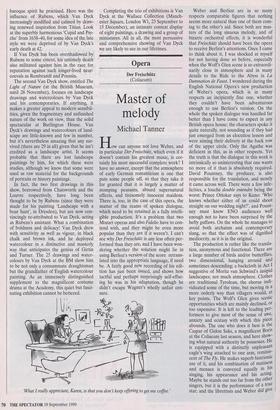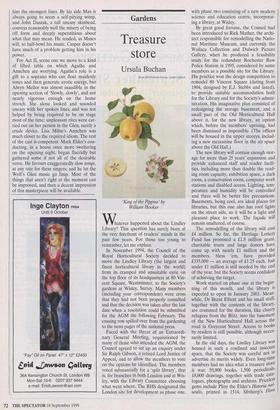Opera
Master of melody
Michael Tanner
How can anyone not love Weber, and in particular Der Freischiitz, which even if it doesn't contain his greatest music, is cer- tainly his most successful complete work? I have no answer, except that the atmosphere of early German romanticism is one that puts some people off, so that they take it for granted that it is largely a matter of stomping peasants, absurd supernatural effects, and tiresomely innocent maidens. There is, too, in the case of this opera, the matter of the reams of spoken dialogue, which need to be retained in a fully intelli- gible production. It's a problem that two Mozart operas and also Fidelio have to con- tend with, and they might be even more popular than they are if it weren't. I can't see why Der Freischiitz is any less often per- formed than they are, and I have been won- dering whether the solution might lie in using Berlioz's version of the score retrans- lated into the appropriate language, if need be. A fairly good new recording of his edi- tion has just been issued, and shows how tactful and perhaps surprisingly self-effac- ing he was in his adaptation, though he didn't escape Wagner's wholly unfair cen- sure.
`What I really appreciate, Karen, is that you don't keep offering to get me coffee.'
Weber and Berlioz are in so many respects comparable figures that nothing seems more natural than one of them com- ing to the other's aid. Since both are mas- ters of the long sinuous melody, and of bizarre orchestral effects, it is wonderful that Freischutz should have been the opera to receive Berlioz's attentions. Once I came to think about it, I was shocked at myself for not having done so before, especially when the Wolf's Glen scene is so extraordi- narily close in atmosphere and in many details to the Ride to the Abyss in La Damnation de Faust. I wondered during the English National Opera's new production of Weber's opera, which is in many respects an incipiently fine one, whether they couldn't have been adventurous enough to use Berlioz's version. On the whole the spoken dialogue was handled far better than I have come to expect in any British opera house; the characters spoke it quite naturally, not sounding as if they had just emerged from an elocution lesson and were aiming their delivery at the back row of the upper circle. Only the Agathe was deficient in this, as in other respects. Yet the truth is that the dialogue in this work is intrinsically so uninteresting that one wants no more of it than is absolutely required. David Pountney, the producer, is also responsible for the translation, and mostly it came across well. There were a few infe- licities, a louche double entendre being the worst: Prince Ottokar says to Kuno: 'Who knows whether either of us could shoot straight on our wedding night?', and Pount- ney must know ENO audiences well enough not to have been surprised by the hefty guffaws. On the whole he manages to avoid both archaism and contemporary slang, so that the effect was of dignified mediocrity, as it is in the original.
The production is rather like the transla- tion, anonymous and functional. There are a large number of birds and/or butterflies, two dimensional, hanging around and sometimes descending; a backcloth in Act I suggestive of Moritz van Schwind's insipid landscapes; not much atmosphere. Clothes are traditional Tyrolean, the chorus indi- viduated some of the time, but moving in a more orderly way than villagers would, at key points. The Wolf's Glen gives scenic opportunities which are mainly declined, or too expensive. It is left to the leading per- formers to give most of the sense of awe, anxiety and ecstasy with which this piece abounds. The one who does it best is the Caspar of Gidon Saks, a magnificent Boris at the Coliseum last season, and here show- ing what natural authority he possesses. He is equipped with a distinctly unpleasant eagle's wing attached to one arm, reminis- cent of The Fly. He makes superb histrionic use of it, and his combination of matiness and menace is conveyed equally in his singing, his appearance and his acting- Maybe he stands out too far from the other singers, but it is the performance of a true star; and the librettists and Weber did give him the strongest lines. By his side Max is always going to seem a self-pitying wimp, and John Daszak, a tall uneasy skinhead, conveys reasonably well the misery of being off form and deeply superstitious about what that may mean. He tended, as Maxes will, to half-howl his music. Caspar doesn't have much of a problem getting him in his power.
For Act II, scene one we move to a kind of lifted table on which Agathe and Annchen are worrying. Agathe's role is a gift to a soprano who can float maidenly tones and then generate erotic energy, but Alwyn Mellor was almost inaudible in the opening section of 'Slowly, slowly', and not nearly vigorous enough on the home stretch. She alone looked and sounded uneasy with her spoken lines, and was not helped by being required to be on stage most of the time; unpleasant rites were car- ried out on her person in the Glen, surely a crude device. Lisa Milne's Annchen was much closer to the required idiom. The rest of the cast is competent. Mark Elder's con- ducting, in a house once more sweltering on the opening night, began flaccidly but gathered some if not all of the desirable verve. He favours exaggeratedly slow tempi, at any rate for these singers; and he let the Wolf's Glen music go limp. Most of the things that aren't right at the moment can be improved, and then a decent impression of this masterpiece will be available.



























































































 Previous page
Previous page